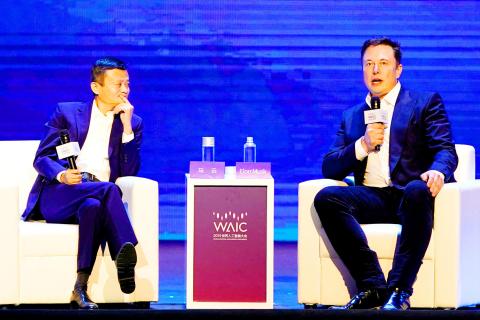Jack Ma (馬雲) believes artificial intelligence (AI) poses no threat to humanity, but Elon Musk called that “famous last words” as the billionaire tech tycoons faced off yesterday in an occasionally animated debate on futurism in Shanghai.
The Chinese cofounder of Alibaba Group Holding Ltd (阿里巴巴) and the maverick industrialist behind Tesla Inc and SpaceX frequently pulled pained expressions and raised eyebrows as they started an AI conference with a dialogue that challenged attendees to keep up.
The issue of AI has provoked increasing concern among scientists, such as British cosmologist Stephen Hawking, who warned that it would eventually turn on and “annihilate” humanity.

Photo: Reuters
“Computers may be clever, but human beings are much smarter,” Ma said. “We invented the computer — I’ve never seen a computer invent a human being.”
While insisting that he is “not a tech guy,” the e-commerce mogul added: “I think AI can help us understand humans better. I don’t think it’s a threat.”
“I don’t know man, that’s like, famous last words,” Musk said.
He said the “rate of advancement of computers in general is insane,” sketching out a vision in which super-fast, artificially intelligent devices eventually tire of dealing with dumb, slow humans.
“The computer will just get impatient if nothing else. It will be like talking to a tree,” Musk said.
Humankind’s hope lies in “going along for the ride” by harnessing some of that computing power, Musk said, as he offered an unabashed plug for his Neuralink Corp.
Neuralink aims to develop implantable brain-machine interface devices, which conjures images of The Matrix, whose characters download software to their brains that instantly turns them into martial arts masters.
“Right now we are already a cyborg because we are so well-integrated with our phones and our computers,” Musk said. “The phone is like an extension of yourself. If you forget your phone, its like a missing limb.”
However, humanity will also have more leisure time in the future as AI takes on much of the burden of transporting, feeding and thinking for earthlings, Ma said.
“People could work as little as three days a week, four hours a day with the help of technology advances,” he said.

Meta Platforms Inc offered US$100 million bonuses to OpenAI employees in an unsuccessful bid to poach the ChatGPT maker’s talent and strengthen its own generative artificial intelligence (AI) teams, OpenAI CEO Sam Altman has said. Facebook’s parent company — a competitor of OpenAI — also offered “giant” annual salaries exceeding US$100 million to OpenAI staffers, Altman said in an interview on the Uncapped with Jack Altman podcast released on Tuesday. “It is crazy,” Sam Altman told his brother Jack in the interview. “I’m really happy that at least so far none of our best people have decided to take them

BYPASSING CHINA TARIFFS: In the first five months of this year, Foxconn sent US$4.4bn of iPhones to the US from India, compared with US$3.7bn in the whole of last year Nearly all the iPhones exported by Foxconn Technology Group (富士康科技集團) from India went to the US between March and last month, customs data showed, far above last year’s average of 50 percent and a clear sign of Apple Inc’s efforts to bypass high US tariffs imposed on China. The numbers, being reported by Reuters for the first time, show that Apple has realigned its India exports to almost exclusively serve the US market, when previously the devices were more widely distributed to nations including the Netherlands and the Czech Republic. During March to last month, Foxconn, known as Hon Hai Precision Industry

PLANS: MSI is also planning to upgrade its service center in the Netherlands Micro-Star International Co (MSI, 微星) yesterday said it plans to set up a server assembly line at its Poland service center this year at the earliest. The computer and peripherals manufacturer expects that the new server assembly line would shorten transportation times in shipments to European countries, a company spokesperson told the Taipei Times by telephone. MSI manufactures motherboards, graphics cards, notebook computers, servers, optical storage devices and communication devices. The company operates plants in Taiwan and China, and runs a global network of service centers. The company is also considering upgrading its service center in the Netherlands into a

Taiwan’s property market is entering a freeze, with mortgage activity across the nation’s six largest cities plummeting in the first quarter, H&B Realty Co (住商不動產) said yesterday, citing mounting pressure on housing demand amid tighter lending rules and regulatory curbs. Mortgage applications in Taipei, New Taipei City, Taoyuan, Taichung, Tainan and Kaohsiung totaled 28,078 from January to March, a sharp 36.3 percent decline from 44,082 in the same period last year, the nation’s largest real-estate brokerage by franchise said, citing data from the Joint Credit Information Center (JCIC, 聯徵中心). “The simultaneous decline across all six cities reflects just how drastically the market